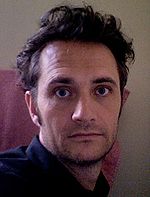Andreas Weber (publicist)
Andreas Weber (born November 4, 1967 in Hamburg ) is a German biologist , biosemiotics , philosopher and publicist .
Life
Weber studied biology with a focus on marine ecology and philosophy in Berlin , Hamburg and Freiburg . It was discussed by Hartmut Böhme (Berlin) and Francisco Varela ( Paris ) about nature as meaning. Attempt of a semiotic theory of the living doctorate.
Weber has been working as a freelance journalist a. a. for taz , Focus , Die Zeit and GEO , later also for Merian (there from 2001 to 2004 as editor), FAZ and Greenpeace magazine . In 2010 he received the German Reporter Prize in the Essay category, and in 2012 the Reportage Prize from the German Nutrition Society (DGE).
In 2007 everything feels. Man, nature and the revolution in the life sciences , a largely poetic and narrative non-fiction book , followed in autumn 2008 by Biokapital. The reconciliation of economy, nature and humanity . In his 2014 book Lebendigkeit. He continues an erotic ecology with the “revolution of the life sciences” begun in Alles geht sich.
Weber is married, has two children and lives in Berlin and Italy.
Think
Following philosophers such as Jakob Johann von Uexküll or Hans Jonas , the Chilean biologists Humberto Maturana and Francisco Varela, but also taking up impulses from the Anglo-Saxon world, Weber advocates overcoming the mechanistic interpretation of life phenomena. Organic existence is described by him as the continuous self- creation of feeling, judgmental and meaning- setting subjects against the background of the possibility of death . Life, as a process of interest in bodily wholeness and development, with the networks it creates, does not go into the analysis of merely object-like processes. In doing so, Weber distinguishes himself from a reductionist popular Darwinism as well as from the concept of intelligent design .
Book publications
- Nature as meaning. Attempt at a semiotic theory of the living . (Dissertation), Würzburg 2003, ISBN 3-8260-2471-0 .
-
Everything feels. Man, nature and the revolution in the life sciences. Berlin Verlag, Berlin 2007 ISBN 3-8270-0670-8
- New edition: thinkOya, Klein Jasedow 2014, ISBN 978-3-927369-86-3 .
- Biocapital. The reconciliation of economy, nature and humanity. Berlin Verlag, Berlin 2008, ISBN 3-8270-0792-5 .
- More mud! - Children need nature . Ullstein, Berlin 2011, ISBN 978-3-550-08817-9 .
- Minima Animalia. A book of hours of nature . thinkOya, Klein Jasedow 2012, ISBN 978-3-927369-68-9 .
- The nonsense-mud book. Kösel, Munich 2013, ISBN 978-3-466-30983-2 .
- Liveliness. An erotic ecology. Kösel, Munich 2014, ISBN 978-3-466-30988-7 .
- Enlivenment. A culture of life. Attempt at poetics for the Anthropocene . Translated from English by Dirk Höfer, Matthes & Seitz, Berlin 2015, ISBN 978-3-95757-160-1 .
- Be alive! For a politics of life. A manifesto for the Anthropocene . With Hildegard Kurt, thinkOya, Klein Jasedow 2015, ISBN 978-3-927369-95-5 .
- Being and sharing. A practice of creative existence . Transcript, Bielefeld 2017, ISBN 978-3-8376-3527-0 .
- Indigeniality . Nicolai, Berlin 2018, ISBN 978-3-96476-010-4 .
- In English
- Enlivenment. Towards a fundamental shift in the concepts of nature, culture and politics . Heinrich Böll Foundation, Berlin 2013, ISBN 978-3-86928-105-6 .
- The Biology of Wonder: Aliveness, Feeling and the Metamorphosis of Science . New Society Publishers 2016, ISBN 978-0-86571-799-2 .
- Matter and Desire. An Erotic Ecology . Chelsea Green, White River Junction 2017, ISBN 978-1-60358-697-9 .
- Enlivenment: Towards a Poetics for the Anthropocene . The MIT Press, Cambridge, MA / London 2019, ISBN 978-0-262-53666-0
Web links
- Literature by and about Andreas Weber in the catalog of the German National Library
- Homepage of Andreas Weber (Author)
- Short biography on beschreiber.de
- Andreas Weber's dissertation: Nature as meaning . Attempt at a semiotic theory of the living
- There is no separation essay in Oya 01/2010
- Wild and dangerous? Thoughts on a Culture of the Wild Essay in Oya 05/2010
- Erotic Ecology Essay in Oya 13/2012
- Edible his essay in Oya 51/2018
- DLF (Deutschlandfunk) nuances. Music and personal questions from December 6, 2015: Andreas Weber, biologist and philosopher, in conversation with Michael Langer
| personal data | |
|---|---|
| SURNAME | Weber, Andreas |
| BRIEF DESCRIPTION | German biologist, biosemiotics, philosopher and publicist |
| DATE OF BIRTH | 4th November 1967 |
| PLACE OF BIRTH | Hamburg |

